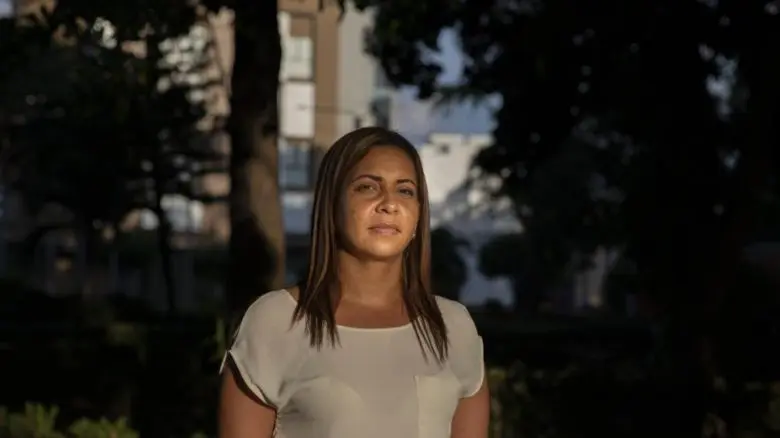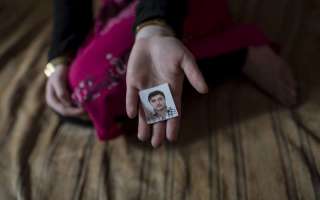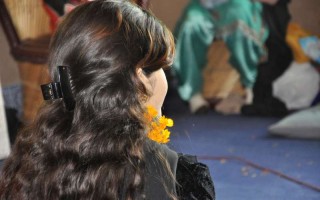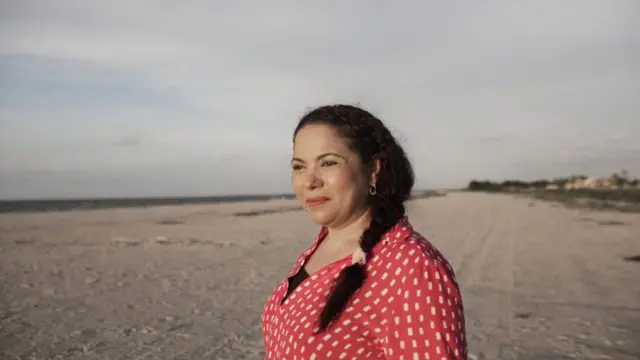
Venezuelan lawyer Rogmalcy Vanessa Apitz started a non-profit foundation in the Colombian border city of Cúcuta that is helping survivors of gender-based violence from her home country. © UNHCR/Fabiola Ferrero
Data shows that displaced women and girls worldwide are experiencing increased gender-based violence during the COVID-19 pandemic.
By UNHCR Staff
Mónica Pérez* met her first boyfriend when she was 16, not long after she stepped off a bus in the Colombian border city of Cúcuta. When she discovered she was pregnant, her boyfriend started to hit her and call her names.
After she went into labour, he dropped her off at the hospital, leaving the teen to give birth alone, far from her mother and sisters back home in Venezuela.
Six months later, she became involved with a new partner. Everything was going well, she said, until the arrival of COVID-19.
“I think it may have had something to do with lockdown, which made him very stressed and constantly worried about being broke,” she recalled. “He started to hurt me and say really awful things to me …. He wouldn’t let me use Facebook or talk to my mother or my sisters. He controlled what I wore and even burned a bunch of my clothes.”
By early April, over half the world’s population was living under lockdown and women like Mónica with violent partners found themselves trapped with their abusers and cut off from the support of friends and family. Within months of the outbreak starting, UN Women was warning of a Shadow Pandemic, as all types of violence against women and girls, but particularly domestic violence, intensified.
Refugee and displaced women were at greater risk from gender-based violence (GBV) even before COVID-19. The pandemic has heightened their vulnerability.
- See also: UNHCR warns second wave of COVID pandemic driving further violence against women and girls
While data has been slow to emerge, with displaced women often afraid or unable to seek help, some patterns are becoming clear. Colombia’s Ministry of Health reported a nearly 40 per cent increase of GBV incidents affecting the country’s Venezuelan population between January and September of this year, compared to the same period last year.
Rogmalcy Vanessa Apitz, a 37-year-old Venezuelan lawyer, who helped start a non-profit foundation in Cúcuta that provides support to Venezuelan women experiencing GBV, said she and her fellow volunteers are now dealing with some 100 cases daily, up from around 15 cases every day before the pandemic.
“The isolation of lockdown has really led to a lot of violence.”
“The isolation of lockdown has really led to a lot of violence,” she said. “The fact of not being able to go out and earn one’s daily bread is a major source of stress for people.”
Similar findings are coming out of other countries with significant populations of displaced people. The Global Protection Cluster – a UNHCR-led network of NGOs and UN agencies providing protection to people affected by humanitarian crises – noted in August that gender-based violence was occurring at a higher incidence in 90 per cent of its operations, including in Afghanistan, Syria and Iraq. Meanwhile, nearly three-quarters of refugee and displaced women surveyed recently by the International Rescue Committee in three regions of Africa reported an increase of GBV in their communities.
Just as levels of violence against women have risen, lockdowns and other movement restrictions have made it more difficult for survivors to report abuse and seek help. Refugee women often lack access to public health facilities and other critical social services and are reliant on services available through NGOs and UN agencies. But COVID has forced many of those services to close and in camps from Kenya to Bangladesh, humanitarian workers have been unable to visit refugees or organize prevention activities.
“In March, we realized we weren’t able to do our normal activities,” said Gabriela Cunha Ferraz, an GBV officer with the UN Refugee Agency (UNHCR) in Kakuma refugee camp in north-western Kenya. “It forced us to start thinking about different ways of reaching people.”
Ferraz and her colleagues added a WhatsApp account to their hotline number so survivors isolated at home with their abusers could message privately with a social worker. They also organized a monthly radio show that airs on a community station widely listened to among refugees in the camp. Staff cover different topics relating to GBV each month and tell listeners how they can access services through helplines.
Across the world, UNHCR and its partner organizations have gone through a similar process of adapting GBV programmes so women can continue to safely access them.
In many locations, this has involved a shift to online support groups and tele-counselling. In Lebanon, for example, GBV staff moved from running prevention sessions for refugee women in physical safe spaces, to running them online. Women receive internet data to allow them to participate in the online sessions, but Martin De Oliveira Santos, an associate protection officer with UNHCR in Lebanon, acknowledged that there are other barriers to delivering services remotely.
“We know in Lebanon, mobile phones aren’t always in the hands of women; they’re sometimes controlled by husbands or fathers,” he said. “We also face varying levels of digital literacy.”
Many of the Rohingya refugee women living in camps in Bangladesh’s Cox’s Bazar district also lack mobile phones to call hotline numbers, according to Kosida, a 19-year-old refugee and volunteer who goes door-to-door in her block of Kutupalong camp to share information on services available for GBV survivors. Lockdowns have made it more difficult to help them access specialized support, but she said the bigger problem was women’s reluctance to speak out against abusive partners.
“It is always difficult for women to speak out against the men.”
“It is always difficult for women to speak out against the men, to protest or to report, because they depend on the men for their living,” she said. “If women are not independent, if they don’t earn their own living, they will always be like this.”
When an in-person intervention is needed, and lockdowns prevent humanitarian workers from moving around communities, refugee volunteers like Kosida are often the critical link between survivors and GBV services.
In Kakuma, Ferraz and her team are relying on refugee community workers hired and trained by a partner organization, the Danish Refugee Council, to be their “eyes and ears in the community” while COVID restrictions remain in place.
“They’re refugees who live in the camps and have been trained to safely identify and refer cases of GBV,” she said. “So, if there’s a report of gender violence within the community, they can check on the survivor’s safety and immediately refer the case to a social worker.”
Mary Husuro a 26-year-old South Sudanese refugee living in Kakuma camp, became a community worker following her own experience of violence at the hands of her former husband. “I was feeling there was no help, but when I got to know the [Danish Refugee] Council, I was helped and given some counselling, and now I’m the one who’s helping.”
At the start of the pandemic, she said, “there was a lot of [gender-based] violence, but women were just keeping quiet because of the fear of the coronavirus”.
Through awareness raising that she and the other community workers have done, she said women in the camp are now aware of the help available to them.
Nabila Berm, a Syrian refugee living in Jordan who is part of a group of young refugee and Jordanian women volunteers making animated videos to raise awareness about GBV, said survivors in her community had a similar fear of reaching out for help early on in the pandemic.
“They didn’t know where they could go. They were scared to move to another friend’s home as they were anxious about getting COVID,” she said, adding that although there was now more awareness about which numbers to call for help, the risk of violence has increased as the economic situation has worsened.
“I am hearing more from women who are experiencing violence because everyone is staying at home and there is less money. People are getting angry and frustrated,” she said. “I am worried that because of this, we are just going to see more and more cases.”
In Cúcuta, Mónica eventually got help when a friend told her about a local NGO called Corprodinco that partners with UNHCR to run a shelter for GBV survivors. Her boyfriend would not let her leave the house but, with help from the police, Corprodinco managed to get her to the shelter. There she has been receiving counselling and learning new skills, such as sewing, that she hopes will equip her to support herself when the time comes.
She often wonders if things would have been different for her if she had been back home in Venezuela, with her mother and sisters to look out for her. “Because I was alone here in Colombia, without anyone to help or support me, [my boyfriend] took advantage of me,” she said.
“I tried many times to leave, but I was afraid. As someone fleeing from Venezuela, I’ve experienced hunger and slept on the street, and I didn’t want to go through that again. But that’s not the way it should be. No one should have to go through domestic violence.”
*Her name has been changed to protect her identity
Writing by Kristy Siegfried, with additional reporting by Jenny Barchfield in Mexico City, Lilly Carlisle in Amman, Jordan, and Iffath Yeasmine in Cox’s Bazar, Bangladesh.





